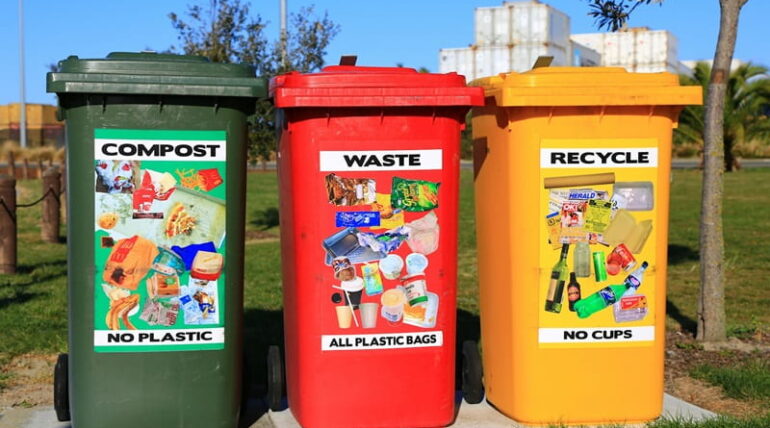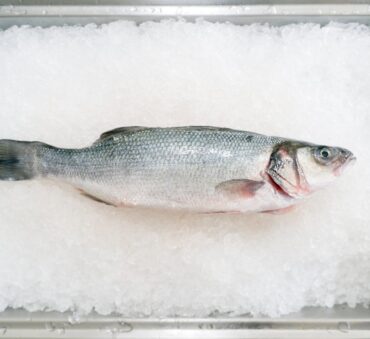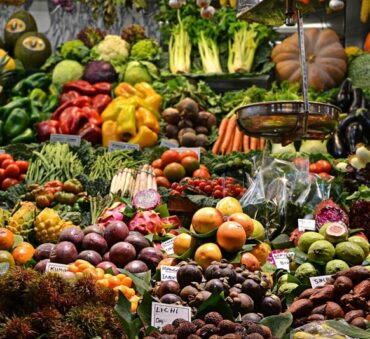Food waste is a growing problem in the United States, accounting for 30-40 percent of the food supply and causing severe environmental, economic, and social repercussions.
Various waste management efforts have emerged to mitigate landfill use, reduce greenhouse gas emissions, and contribute to the U.S.’ goal to cut food loss and waste in half by 2030. Among these, food waste collection services have surfaced as a valuable solution for getting individuals and businesses involved.
Keep reading to explore how food waste pick-up services operate, the different types of collection services available, their benefits, and the challenges they face.
Key Takeaways
- Food waste collection programs help households and businesses reduce waste, comply with local regulations, and meet sustainability goals, positioning it as a valuable resource for both consumers and commercial businesses.
- Food waste reduction programs vary depending on their specific resources, requirements, and objectives; however, city- and community-wide programs generally provide waste collection bins and curbside collection to streamline the process, raise awareness, and encourage participation.
- There are various food waste treatment methods that can be implemented to improve environmental sustainability, including composting, anaerobic digestion, aerobic digestion, and biochar production.
- Waste management programs face multiple obstacles, including contamination, financial restraints, a lack of proper infrastructure, changing policies, and a lack of food waste technology. A well-developed plan must address each of these issues to ensure a successful project outcome.
The Basics of Food Waste Collection Services
Food waste pick-up services are programs dedicated to collecting food scraps from households, businesses, and other establishments. While various strategies may be implemented, these programs typically involve providing designated food waste bins to participants and collecting them on a predetermined schedule.
The main goal of these programs is to facilitate the recycling of organic waste and improve landfill diversion, therefore conserving resources, reducing pollution, and lowering greenhouse gas emissions associated with food waste.
Food waste collection solutions are typically supported by local governments, private waste management companies, or nonprofit organizations. By providing individuals and businesses with fast and reliable solutions, these programs improve awareness and encourage participants to make a difference in their community.
Types of Food Waste Collection Services
There are various types of food waste collection services available, including:
- Municipal: Cities that receive government support can reduce large-scale waste by having easier access and funding for waste reduction infrastructure, helping them meet city-wide waste reduction goals. Government-run programs may be offered directly by local governments or in partnership with private organizations through local government initiatives.
- Commercial: Commercial waste collection services are specifically aimed at businesses and commercial establishments. These services help meet the specific goals of small and large businesses, helping them improve their recycling efforts and reach their unique sustainability goals.
- Private services: Private food waste pick-up services are provided to individuals or businesses by private organizations. These services vary depending on the specific needs of each client, with tailored solutions regarding recycling options and the frequency of collection.
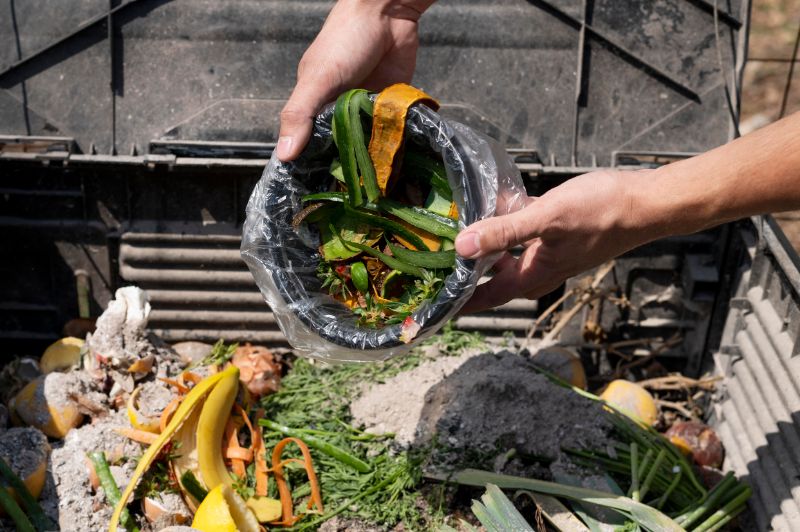
Who Can Benefit from Food Waste Pick Up
Anyone who generates food waste can benefit from city- or community-wide food waste collection solutions, including:
- Households: The average household wastes 6.2 cups of food in a typical week, highlighting the need for sustainable recycling solutions. To reduce the environmental consequences of household food waste, food waste collection services facilitate recycling efforts, encouraging households to be more aware of their waste generation.
- Restaurants: Restaurants generate large amounts of waste due to inefficient inventory and storage management, large portion sizes, and poor demand forecasting. Improved management of restaurant waste can enhance the reputation of small and large food establishments and provide them with potential tax incentives.
- Schools: American schools waste an estimated 530,000 tons of food annually, often due to operational challenges, menu restrictions, and the timing of school lunches. Food waste pick up is an opportunity to address food waste in school cafeterias and cultivate a culture of sustainability within the school community.
- Other institutions and establishments: A variety of businesses and industries can benefit from collection services, including grocery stores, office buildings, hotels, hospitals, sports venues, and correctional facilities. By implementing food waste management strategies, these establishments can ensure compliance with local regulations.
How Food Waste Collection Works
Every food waste reduction program has different resources, requirements, and objectives, meaning that programs may vary depending on location. That said, the collection process is typically as follows:
- Sign up for the program: Anyone interested in joining a food waste pick-up program should sign up via email or by filling out an online form. This ensures that participants receive the necessary food waste collection bins and comply with the predetermined collection schedule.
- Separate food waste: Participants must then separate their food waste from other types of waste to avoid contamination. Many programs provide bins, kitchen cadies, or thick compostable bags to facilitate food waste collection.
- Curbside collection: On collection day, individuals and businesses must place their food waste bins at their curbside or other designated collection point. Collection schedules are determined by local waste management policies or private company practices and depend on factors such as the number of participants and available resources, but typically include weekly or biweekly collection.
- Transportation and treatment: Food waste is then collected and taken to a food waste treatment center, which may include composting facilities, anaerobic digestion plants, or other organic waste processing sites.
Types of Food Usually Collected
Among the most wasted foods are everyday staples in U.S. households, many of which are also commonly accepted by food waste pick up companies. This includes:
- Fruits and vegetables, including peels
- Bread, pasta, rice, grains, baked goods
- Nuts, beans, seeds, including shells
- Meat, fish
- Herbs and spices
- Coffee grounds and loose-leaf tea
- Eggshells
*Your food waste recycling program may have certain guidelines and restrictions depending on local regulations and specified recycling methods. We recommend checking with them to confirm accepted food waste items.
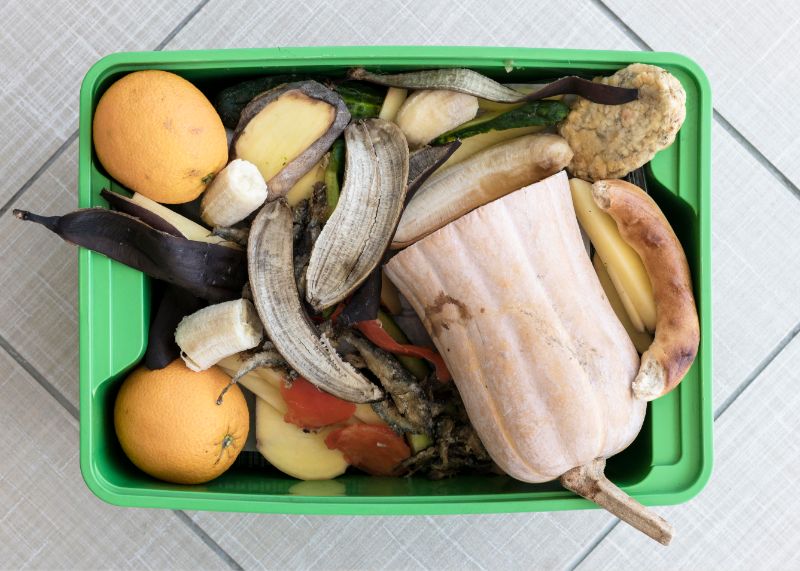
What Happens to Food Waste After Collection?
After food waste is collected, it’s transported to a treatment center, where it’s processed and transformed into useful products. Food waste treatment is a critical step in food waste pick-up programs, as it closes the loop on organic waste recycling and contributes to environmental sustainability efforts.
There are various recycling strategies that can be implemented, including:
- Composting: Composting food waste is a very popular technique in food waste collection services. This approach reduces landfill use and transforms food waste into nutrient-rich soil amendment that supports plant growth and reduces the need for chemical fertilizers.
- Anaerobic digestion: Anaerobic digestion is a series of processes where microorganisms break down biodegradable matter in an oxygen-free environment. This process creates two valuable byproducts: biogas, a renewable energy source, and digestate, a nutrient-rich substance that can be used as fertilizer. By turning waste to biogas, anaerobic digestion diverts food from landfills and creates an environmentally friendly solution.
- Aerobic digestion: Aerobic digestion is a process where microorganisms break down waste in an oxygen-rich environment. This method turns food waste into carbon dioxide and water, which is then disposed of in drainage systems or used as fertilizer for plants.
- Biochar production: Biochar is a carbon-rich product that offers many environmental benefits in the agricultural sector. Biochar services support a circular economy by reducing waste, keeping carbon out of the atmosphere, and creating a solution that maintains a high nutrient level in the soil.
Benefits of Food Waste Collection Services
Food waste collection services provide various environmental benefits that contribute to long-term sustainability goals. In addition to minimizing pollution and improving resource efficiency, reducing food waste in landfills also reduces the production of methane emissions, a powerful greenhouse gas that contributes to global warming.
Different recycling approaches also offer additional benefits to the environment, including compost’s ability to improve soil health and anaerobic digestion’s role in creating a renewable energy source.
From a social perspective, local initiatives bring awareness to the current food waste crisis, encouraging businesses and households to reduce waste and promote food donation programs. Food waste collection programs also provide employment to community members, contributing to local economic development.
To reduce the economic impact of food waste, collection services lower municipal landfill expenses and can create new revenue streams, making it a valuable solution for small and large businesses.

Challenges and Considerations
Waste management programs face multiple obstacles, including:
- Contamination: When non-organic materials are mistakenly thrown into food waste bins, it complicates the recycling process. To address this issue, improved education and enhanced sorting processes are required.
- Financial restraints: There are many costs associated with the collection, sorting, and processing of organic waste. Insufficient funding makes it hard for some communities to implement new initiatives, especially without government support.
- Lack of proper infrastructure: Inaccurate collection, transportation, and treatment of food waste can result in serious environmental consequences. Programs must often invest in proper infrastructure to ensure public health and prevent environmental deterioration.
- Changing policies: Waste management policies vary among cities and states, meaning that programs must stay up-to-date with new regulations to avoid fines and ensure a successful outcome.
- Lack of technology: Food waste technology helps manage waste in an efficient way, streamlining the entire collection and treatment process. While not required, modern technology is a great tool in food waste pick-up services.
The Bottom Line
Food waste collection services provide an easy and efficient solution to food waste, helping households and businesses alike reduce waste and improve sustainability efforts. If you’re interested in reducing waste, we encourage you to explore what local initiatives are available to you.
If you’re looking for a tailored approach to commercial food waste disposal, then we recommend working directly with an organic waste management company. At Shapiro, we provide a range of services that include the collection, transportation, treatment, and recycling of organic waste. We’ll work closely with you to create a cost-efficient and environmentally friendly solution that meets your unique business needs.
Contact us to learn more about our services.
Baily Ramsey, an accomplished marketing specialist, brings a unique blend of anthropological insight and marketing finesse to the digital landscape. Specializing in educational content creation, she creates content for various industries, with a particular interest in environmental initiatives.
